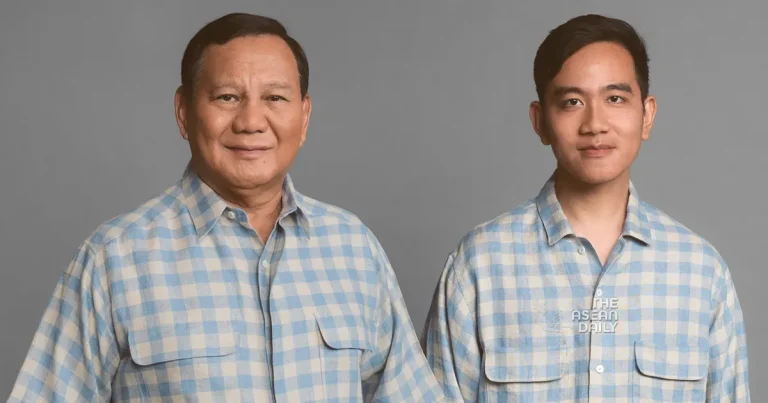15-2-2024 (JAKARTA) In a resounding victory, Prabowo Subianto, the front-runner, has emerged as the winner of Indonesia’s presidential race, according to unofficial quick count results from the February 14 polls. Garnering approximately 60 percent of the vote, Subianto, at 72 years old, becomes the oldest candidate to secure the presidency after two previous unsuccessful bids against President Joko Widodo in 2014 and 2019.
Subianto’s political journey began in 2004, following a controversial military career, and he has since displayed remarkable resilience. His initial taste of election politics came in 2009 when he ran as the vice-presidential candidate alongside fifth President Megawati Sukarnoputri, but they were defeated. Subsequently, in 2008, Subianto co-founded the Gerindra political party and has served as its chair since 2014. Under his leadership, Gerindra has risen to become the third-largest party in Parliament, holding 78 seats.
During this election, Subianto sought to reinvent himself, shedding his tough-talking military-man persona for a more approachable image. His rallies were filled with energy, featuring catchy music and his trademark “gemoy” or cute dance moves, which have now become a popular phenomenon even in Zumba workout classes. Although he did not receive an explicit endorsement from President Widodo, his association with his former political foe-turned-friend, popularly known as Jokowi, has contributed to a surge in Subianto’s popularity. President Widodo’s leadership approval ratings have consistently exceeded 70 percent.
Five years have passed since Subianto vehemently protested against the results of the highly polarizing 2019 presidential polls. The aftermath of his protests led to two days of violent riots in Jakarta, claiming at least eight lives and leaving hundreds more injured. In what many perceive as a political quid pro quo, Subianto later assumed the role of defense minister under President Widodo’s administration in 2019. In the weeks leading up to February 14, the two leaders shared warm company during meals, symbolizing an apparent reconciliation. They dined together at a restaurant in the upscale Menteng area of Jakarta on January 5, and later that month, they shared a meal of meatball soup at a street stall in Magelang, Central Java.
Subianto has consistently expressed his commitment to continuing President Widodo’s ambitious economic development plans and legacy infrastructure projects, including the relocation of the administrative capital from Jakarta to Nusantara in East Kalimantan. However, some analysts question his loyalty to President Widodo and speculate about the future of their harmonious relationship. Yoes Kenawas, a research fellow at Atma Jaya Catholic University, raises doubts about whether Mr. Gibran, Prabowo’s running mate and the son of President Widodo, will patiently wait for a potential two-term presidency or split midway. Kenawas suggests that Gibran will need to build his own portfolio over the next five years to demonstrate his leadership capabilities independently of his father’s influence.
Nevertheless, some believe that Subianto, given his advanced age, may honor his commitment to President Widodo. After all, he is no longer the robust army lieutenant-general he once was. Subianto joined Abri, the former name for the Indonesian armed forces, in 1974 and rose through the ranks to become the commander of the prestigious special forces (Kopassus) in 1996. Two years later, he assumed command of the elite Army Strategic Reserves Command (Kostrad). During his recent campaigning efforts, known locally as “safari politik” or political safari, Subianto appeared fatigued. Footage from a walkabout in Cilincing, a poor neighborhood in northern Jakarta, showed him limping and relying on someone’s support. At another event, he stumbled and fell while performing his now-famous awkward dance moves.
However, Subianto’s determination appears to surpass physical limitations. During his visits to various provinces in Sumatra, where he enjoys strong support, he met with voters who cheered his name, shook his hands, and took selfies with him. His speeches were passionate, and his voice resonated with thunderous energy, whether he discussed plans to provide free lunches and milk as part of nutrition programs to combat child stunting or countered criticisms of being too emotional and unpolished. Unapologetically, the retired three-star lieutenant-general addressed voters, stating, “I’m an ex-soldier; I speak plainly. I don’t talk like the elites or academicians. Their words are just theories, empty words.”
However, some find Subianto’s plain-speaking style jarring, considering his privileged background. Born into one of Indonesia’s most influential families, he is the third of four siblings. His father,Sumitro Djojohadikusumo, was an economist and former minister in the government of President Sukarno. Subianto attended prestigious schools in Indonesia and the United States, including the Indonesian Military Academy and the Command and General Staff College at Fort Leavenworth, Kansas.
Critics also express concerns about Subianto’s human rights record, particularly his alleged involvement in human rights abuses during his military career. He was dismissed from the military in 1998 for his role in the abduction and torture of activists during the Suharto regime. However, Subianto has denied these allegations and has not faced any legal consequences.




